
Gut Feelings: Exploring the Gut-Brain Axis and Its Impact on Mental Health
The Gut-Brain Axis Explained The gut-brain axis is a

Short-chain fatty acids (SCFAs) are essential metabolites produced through the fermentation of dietary fibers by the human gut microbiota. This microbiota, which consists of trillions of microorganisms residing in the gastrointestinal tract, plays a crucial role in human health, influencing digestion, nutrition, and immune function.
SCFAs are essential for gut health, they maintain the integrity of the intestinal lining and regulating immune responses. They strengthen the intestinal barrier, boosting the production of mucin and tight junction proteins, which help avert conditions like leaky gut syndrome. They also exhibit anti-inflammatory effects, lowering the levels of pro-inflammatory cytokines while enhancing the production of anti-inflammatory mediators. This delicate balance is essential for managing inflammatory bowel diseases (IBD) and a range of other gastrointestinal issues.
SCFAs have a significant impact on both health and disease, extending their benefits beyond gut health. They play a key role in mitigating chronic conditions such as obesity, type 2 diabetes, and inflammatory bowel disease (IBD) due to their anti-inflammatory properties. They influence lipid metabolism and stimulate the release of hormones that regulate appetite. Moreover, SCFAs are crucial for the development of regulatory T cells, white blood cells that maintain immune balance by combating infections and preventing the body from attacking its healthy cells, reducing the risk of autoimmune disorders.
SCFAs also contribute to cardiovascular health by reducing cholesterol absorption, which helps lower the risk of atherosclerosis. Emerging research suggests that SCFAs may also have a role in cancer prevention, particularly with respect to colorectal cancer, by affecting the tumor microenvironment.
This underscores the therapeutic potential of SCFAs in addressing a variety of diseases and highlights the need for ongoing research into their diverse health-promoting roles.
SCFAs are primarily produced in the colon when gut bacteria ferment non-digestible carbohydrates (such as fiber). This fermentation process is vital for the gut microbiome, contributing to energy production, gut health, and overall well-being. SCFA production is influenced by the type of fiber consumed, with prebiotic-rich foods, such as garlic, onions, and bananas help foster the growth of SCFA-producing bacteria in the gut.
There are three main types of SCFAs, each with unique roles in human health:
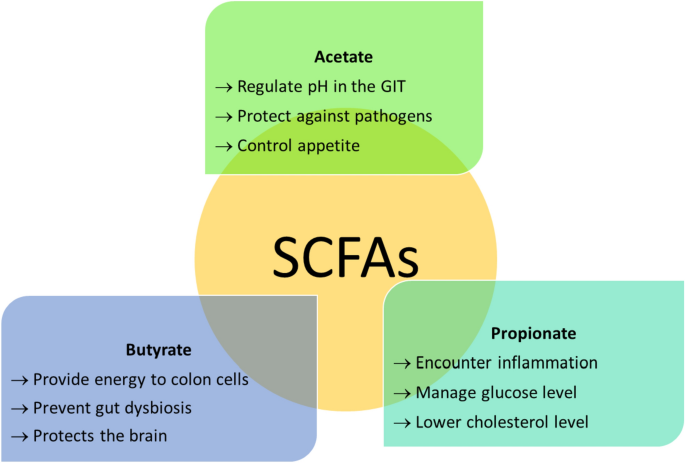
SCFAs serve as signaling molecules within the gut microbiome. They promote the growth of beneficial bacteria and inhibit the proliferation of pathogenic bacteria. This balance is essential for digestive health, nutrient absorption, and immune function, by regulating the differentiation, recruitment, and activation of immune cells. The role of SCFAs in shaping the microbiome also contributes to their ability to influence systemic health and overall well-being.
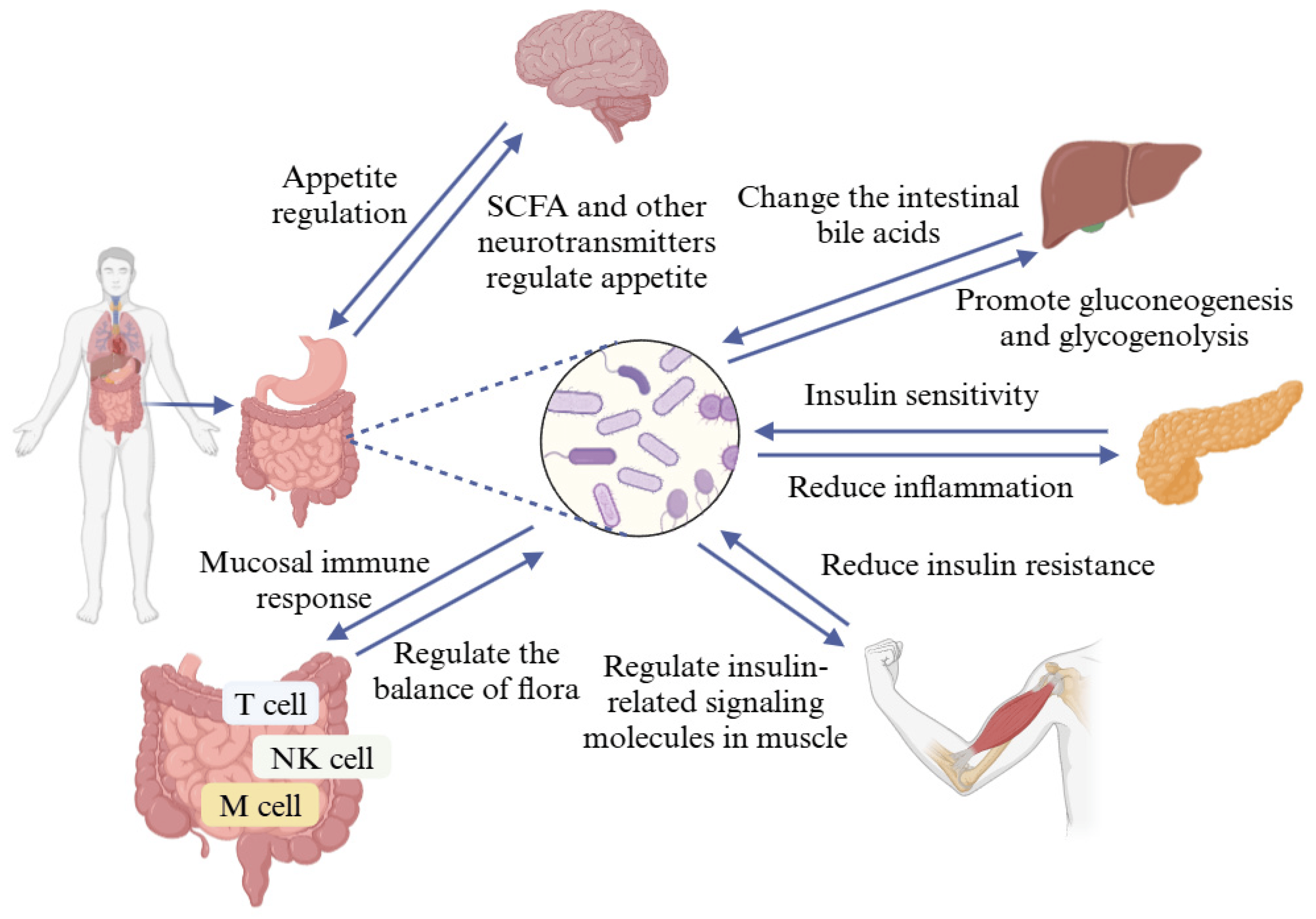
SCFAs are critical for maintaining the structural integrity of the gut barrier and overall gut health. They regulate the expression of tight junction proteins that prevent harmful pathogens and toxins from entering the bloodstream. Butyrate, in particular, is vital for supporting gut barrier function and preventing “leaky gut” syndrome.
Unbalanced gut microbiota is a significant factor in the rapid progression of Type 2 Diabetes (T2D) and insulin resistance, accounting for approximately 90% of diabetes cases worldwide. Research indicates that individuals with T2D often exhibit diminished levels of SCFA-producing bacteria, which can lead to insulin resistance and contribute to gut inflammation. This dysbiosis negatively impacts glucose metabolism and exacerbates the risk of chronic diseases associated with T2D.
SCFAs have a mutually beneficial relationship with the gut microbiota. Gut bacteria ferment dietary fibers to produce SCFAs, and in turn, SCFAs provide energy for the colon and promote the proliferation of beneficial gut bacteria. This interaction supports a healthy gut environment, balancing microbial populations, reducing inflammation, and enhancing digestive function.
Probiotics and short-chain fatty acids (SCFAs) work synergistically to enhance gut health and metabolic processes. Probiotics, often termed “good” bacteria, ferment dietary fibers like resistant starch and inulin-type fructans that human digestive enzymes cannot, to produce SCFAs, including acetate, propionate, and butyrate. These SCFAs serve vital roles, such as providing energy for colon cells, maintaining gut barrier function, and possessing anti-inflammatory properties that protect against colonic diseases. Additionally, the fermentation of dietary fibers leads to increased SCFA levels in the colon, which are linked to the secretion of hormones that help regulate appetite and insulin levels, fostering improved metabolic health.
Various diets can alter microbial composition, increase the ratio of harmful bacteria to beneficial bacterial metabolites, and contribute to the development of chronic metabolic diseases, such as obesity, and inflammatory diseases.
Gut bacteria generate specific enzymes that facilitate the breakdown of dietary fibers into short-chain fatty acids. Various bacterial species exhibit a strong specialization in synthesizing different types of SCFAs. For instance, Faecalibacterium prausnitzii is recognized as a key producer of butyrate, an important SCFA, while other bacterial types are responsible for generating propionate and acetate. The activity of these enzymes is vital for maintaining optimal gut health and promoting efficient energy metabolism within the body.
SCFAs, particularly butyrate, play a vital role in strengthening the gut barrier. Studies published in Gut Microbes (2021) show that butyrate enhances the function of tight junction proteins, reducing intestinal permeability and preventing the “leaky gut” condition. Butyrate also fuels colonocytes, ensuring they remain healthy and maintain the structural integrity of the gut lining. The effects of SCFAs on gut barrier function underscore their importance in maintaining overall digestive health.
SCFAs influence appetite regulation through their effects on gut hormones like GLP-1 and PYY. A 2022 study highlights how SCFAs stimulate the release of these hormones, which signal satiety to the brain. This mechanism helps regulate food intake and has implications for weight management.
Acute administration of inulin-propionate (which can be metabolised by the microbiota into propionate in the colon) to overweight adults significantly increases postprandial GLP-1 and peptide YY levels through the action of GPR43, promoting glucose decomposition and weight loss, you can read more bout these clinical studies here.
This aligns with findings that SCFAs can act as a natural “obesity enzyme,” modulating hunger and metabolism through their effects on gut hormones.
These insights highlight the importance of dietary fibers and SCFAs in appetite regulation and weight management, suggesting that increasing SCFA-producing foods in the diet may be beneficial for controlling appetite and supporting metabolic health.
SCFAs, particularly propionate, have been shown to improve insulin sensitivity and glucose metabolism. Research from Nature Reviews Endocrinology (2022) suggests that propionate plays a crucial role in regulating blood sugar levels, maintenance of glucose homeostasis, enhancing glucose uptake by cells, and reducing the risk of metabolic diseases like type 2 diabetes. Additionally, SCFAs interact with free fatty acid receptors (FFARs) located in various tissues, influencing lipid and glucose metabolism. By activating these receptors, SCFAs enhance insulin secretion, improve glucose tolerance, and modulate inflammatory responses, ultimately contributing to a balanced gut microbiome and a lower risk of metabolic disorders.
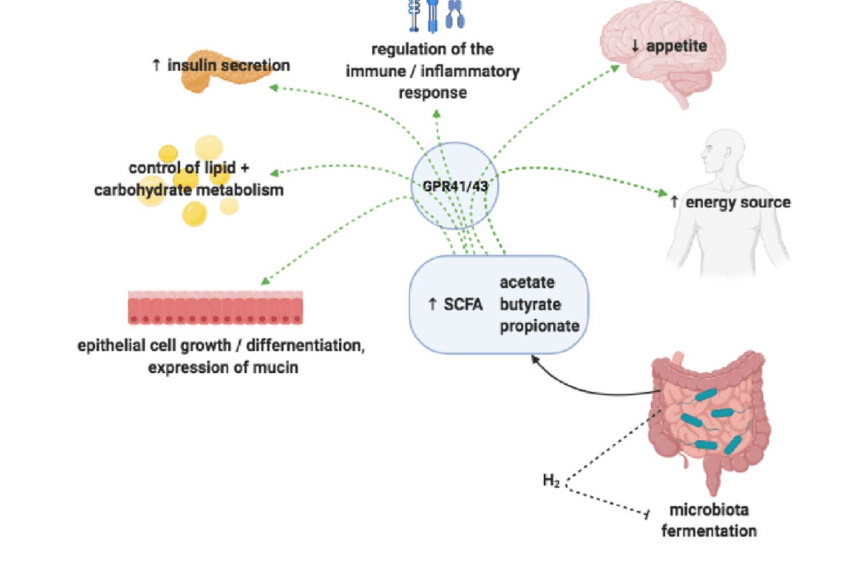
SCFAs, especially acetic acid and propionate, influence lipid metabolism by promoting fat breakdown and lowering cholesterol levels. A 2022 study in Cell Metabolism demonstrates that SCFAs support the regulation of lipid profiles, contributing to healthier cholesterol levels and reduced cardiovascular risks. Deficiency of prebiotic fiber and insufficient signaling through gut metabolite-sensing receptors leads to cardiovascular disease.
SCFAs are crucial for regulating fat storage and metabolism. They activate essential pathways such as PGC-1α, which helps your body produce energy from fat, and AMPK, which acts as a master switch that helps your body burn fat more effectively. This process enhances fat oxidation, boosts insulin sensitivity, and supports weight loss, particularly on high-fat diets. Additionally, SCFAs promote the expression of G protein-coupled receptors (GPR41 and GPR43) in fat tissue, which signals your cells to increase triglyceride breakdown and convert fat into energy, thus helping to reduce fat accumulation.
Research indicates that SCFAs may also offer protection against high-fat diets – induces obesity. By enhancing the body’s energy expenditure and regulating fat storage, SCFAs can counteract the metabolic changes associated with excessive fat intake. Studies have shown that SCFAs play a role in inhibiting fat cell development, which further aids in obesity management [MDPI]. Overall, SCFAs serve as vital energy sources for tissues and significantly influence fat storage and metabolic health, making them promising targets for obesity treatment. Professor Gary Frost of Imperial College, London conducted a significant study titled “Short chain fatty acids in the regulation of energy homeostasis“, revealing how SCFAs—acetate, propionate, and butyrate—affect energy balance by regulating appetite, fat storage, and insulin sensitivity. The findings suggest SCFAs may be a promising target for obesity treatment by enhancing fat burning and improving insulin sensitivity.
Short-chain fatty acids (SCFAs), particularly butyrate, play a significant role in metabolic health. Research highlighted in PubMedindicates that SCFAs can enhance insulin sensitivity, reduce inflammation, and improve energy metabolism, contributing to overall metabolic health. Furthermore, SCFAs, through their interaction with specific receptors, stimulate pathways associated with autophagy, derived from the Greek words for “self” (auto) and “eating” (phagy), which is a crucial cellular process that maintains homeostasis by degrading and recycling cellular components promoting cellular maintenance and repair. This dual functionality not only supports metabolic processes but also helps in the prevention of metabolic disorders, illustrating the importance of SCFAs in maintaining a healthy body.
The importance of autophagy in maintaining healthy aging cannot be overstated. As organisms age, the efficiency of autophagy decreases, leading to the accumulation of damaged proteins and organelles. This accumulation can contribute to age-related diseases, including neurodegeneration, cancer, and metabolic disorders. Enhancing autophagy has been associated with improved cellular health, a reduction in the onset of age-related diseases, and an extension of lifespan in various model organisms. Furthermore, autophagy plays a vital role in regulating inflammation and the immune response, both of which are crucial for healthy aging.
Research has indicated that lifestyle factors such as diet and exercise can influence autophagy. Certain nutrients and caloric restriction have been shown to activate autophagy pathways, suggesting that interventions targeting this process may promote healthy aging and longevity.
SCFAs have strong anti-inflammatory effects in the gut and throughout the body. A study in The Journal of Clinical Investigation shows that SCFAs, especially butyrate, suppress pro-inflammatory cytokines and boost anti-inflammatory pathways, reducing inflammation linked to chronic conditions like inflammatory bowel disease (IBD). Additionally, SCFAs enhance skin health by combating oxidative stress and regulating collagen synthesis. Research in Frontiers in Physiology indicates that butyrate’s antioxidant properties lower reactive oxygen species (ROS), which can harm skin cells and accelerate aging. By decreasing oxidative stress, SCFAs help maintain skin cell integrity and promote collagen production, improving skin appearance and highlighting SCFAs’ potential in dermatological care.
SCFAs imbalance can significantly impact muscle inflammation and overall muscle health. According to a study published in The Archives of Toxicology, a deficiency in SCFAs, particularly butyrate, can lead to an increased inflammatory response in muscle tissues. This is because SCFAs play a critical role in modulating immune responses and inhibiting pro-inflammatory cytokines. When there is an imbalance in SCFA levels, it can result in heightened muscle inflammation, which is linked to various conditions such as sarcopenia and other muscular degenerative diseases. Increasing fiber intake, may help in reducing inflammation and promoting muscle repair and growth, ultimately supporting better muscle function and overall metabolic health. For a detailed examination of these effects, refer to the study here.

Mental health significantly influences the production of short-chain fatty acids (SCFAs) and consequently affects whole-body health through the gut-brain axis. Dysregulation of this axis, often associated with mental health disorders such as anxiety and depression, can lead to decreased microbial diversity and a reduction in the gut bacteria capable of producing SCFAs. For example, chronic stress, a common contributor to anxiety and depression, has been shown to alter the composition of gut microbiota, particularly reducing the abundance of beneficial bacteria like *Fecalibacterium prausnitzii*, which is known for its role in producing butyrate. Low levels of butyrate have been linked to impaired intestinal barrier function and increased inflammation, leading to conditions such as leaky gut syndrome. This dysfunction not only exacerbates mental health issues but can also contribute to physical health problems, including gastrointestinal disorders, obesity, and metabolic syndrome.
Moreover, SCFAs play a crucial role in the production of serotonin, a key neurotransmitter that regulates mood and emotional well-being. The presence of butyrate, in particular, has been shown to enhance serotonin synthesis in the gut, positively impacting mood and reducing the risk of anxiety and depression. Therefore, a healthy concentration of SCFAs not only supports gut health but also promotes stable mental health by ensuring optimal serotonin production. Furthermore, SCFAs are crucial for neurotransmitter production and can modulate emotion and cognition, highlighting their role not only in gut health but also in mental well-being. This reciprocal relationship is explored further in our Gut-Brain axis article here.
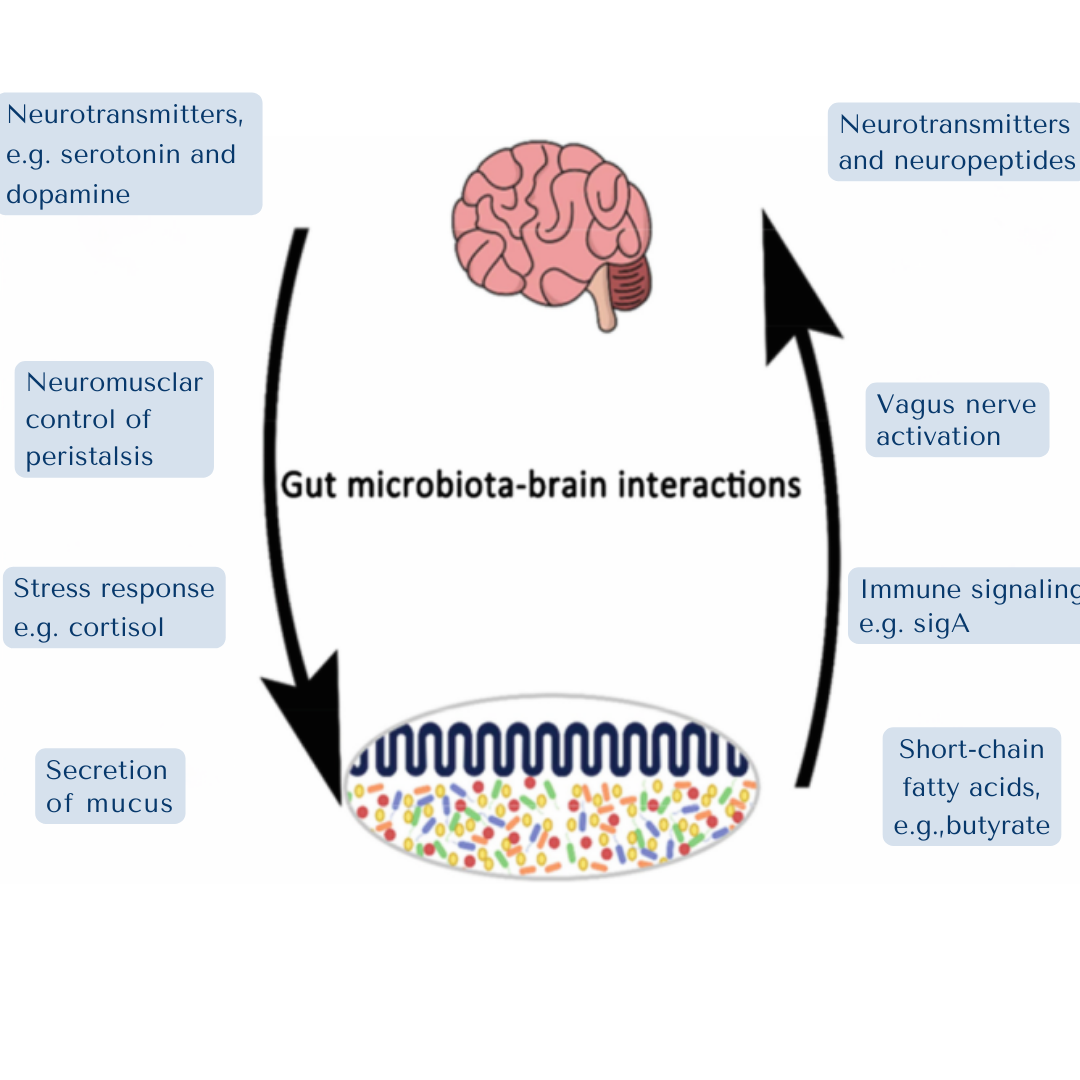
Probiotic strains from genera like Bifidobacterium and Lactobacillus contribute to the modulation of the gut microbiota, fostering an environment conducive to the growth of SCFA-producing bacteria. Though they are naturally present in the human gut, supplementing these probiotics can provide additional benefits. This can be particularly beneficial when the gut microbiome is disrupted, such as after antibiotic use or in individuals with digestive disorders. Probiotics help accelerate the fermentation of dietary fibers, leading to increased production of SCFAs like acetate, butyrate, and propionate, which are critical for gut health, immune function, and metabolism. Research has shown that probiotics, through their fermentation activity, not only promote SCFA synthesis but also improve gut barrier integrity and reduce inflammation (O’Leary et al., 2020; Zhang et al., 2021).
Studies have indicated that probiotic supplementation can lead to increased fecal Short Chain Fatty Acids concentrations, highlighting their potential as a therapeutic adjunct for conditions like inflammatory bowel disease (IBD) and metabolic disorders [Michels et al., 2019]; [Liu et al., 2022].Moreover, the diverse mechanisms by which different probiotic strains operate may yield varied SCFA profiles, underscoring the importance of strain specificity in probiotic applications for health benefits. As research continues to explore this relationship, it becomes evident that incorporating probiotics into dietary interventions may be a promising strategy for enhancing SCFA levels and improving overall gut health.
Short-chain fatty acids (SCFAs) are primarily produced through the fermentation of dietary fiber in the gut, making fiber a vital source of these important metabolites. There are two main types of dietary fiber: soluble and insoluble, both of which contribute to SCFA production but in different ways.
Soluble Fiber: Soluble fibers, such as pectins and inulin, dissolve in water and are readily fermented by gut microbiota, acting as prebiotics. Foods rich in soluble fibers include fruits, vegetables, legumes, and whole grains. As these fibers are fermented, they lead to the production of SCFAs, specifically acetate, propionate, and butyrate. These SCFAs not only serve as energy sources for colon cells but also contribute to gut health and metabolic regulation.
Insoluble Fiber: On the other hand, insoluble fibers do not dissolve in water and are found in foods like whole grains and certain vegetables. While they do not undergo fermentation as readily as soluble fibers, they still provide some substrates for fermentation processes in the gut, albeit to a lesser extent. Both types of fiber play a role in promoting a healthy microbiome, influencing the composition of gut bacteria, and supporting overall metabolic health.
Resistant Starches: Additionally, resistant starches, a category of dietary fiber found in foods such as artichokes, avocados, and some whole grain products, act as prebiotics by resisting digestion in the small intestine and being fermented in the large intestine. This fermentation process further enhances the production of SCFAs, thereby positively impacting metabolic health.
In summary, a diet rich in both soluble and insoluble fibers, including resistant starches, optimizes the microbiota composition and the production of SCFAs. This not only supports a healthy microbiome but also promotes various health benefits, such as improved metabolism and reduced inflammation. Slavin, J. (2013). “Fiber and Prebiotics: Mechanisms and Health Benefits.”
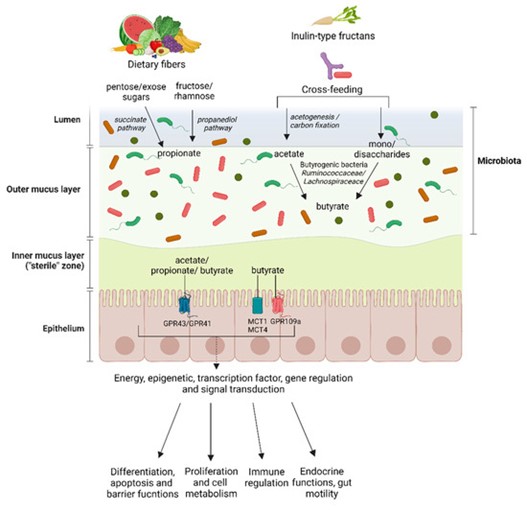
To maximize the production of SCFAs and support a thriving microbiome, it is essential to adopt a diet rich in diverse sources of dietary fiber, ideally aiming for at least 25 to 38 grams of fiber per day as recommended by health authorities. Incorporating a variety of fruits, vegetables, legumes, whole grains, and nuts not only provides soluble and insoluble fibers but also introduces resistant starches into your meals.
Fruits and Vegetables: Aim for at least five servings of fruits and vegetables daily. High-fiber options include:
– Bananas: Approximately 3 grams of fiber per medium banana
– Artichokes: About 10 grams of fiber per medium artichoke
– Carrots: Around 4 grams of fiber per cup, raw
Legumes: Beans and lentils are particularly rich in soluble fibers. Consuming 1 cup of cooked lentils provides around 15.6 grams of fiber, while just one cup of cooked black beans yields about 15 grams.
Whole Grains: Incorporate whole grains like oats, quinoa, and barley into your meals. For example, a half-cup of cooked oats delivers about 4 grams of fiber, while the same serving of cooked barley contributes approximately 6 grams.
Nuts and Seeds: A handful of mixed nuts (about 1 ounce) can provide roughly 3 grams of fiber, with almonds, in particular, offering about 3.5 grams per ounce.
Fermented Foods: Including fermented foods is also crucial for enhancing gut microbial diversity and promoting the fermentation processes necessary for SCFA production. Just 1 cup of yogurt offers around 0.5 grams of fiber, but it’s rich in probiotics that support a healthy microbiome, while 1 ounce of sauerkraut provides roughly 1 gram of fiber and adds beneficial bacteria.
In conclusion, SCFAs like acetate, propionate, and butyrate are key microbial metabolites with significant health benefits for conditions such as IBD, metabolic disorders, and neurodegenerative diseases. Their production from dietary fiber highlights the link between diet, gut microbiota, and health. SCFAs help maintain intestinal integrity, modulate immune responses, and promote regulatory T cell differentiation, reducing inflammation and enhancing gut health. They also improve insulin sensitivity, regulate appetite, and aid in weight management, which is crucial for addressing obesity and Type 2 diabetes. As energy sources for colonocytes and signaling molecules, SCFAs are vital for gut health and metabolism. Emerging research shows their role in neuroprotection, illustrating the importance of the gut-brain axis. Continuous exploration of SCFAs’ mechanisms and therapeutic uses suggests they are essential for future dietary strategies and microbiome-focused therapies. For more detailed information on SCFAs’ therapeutic implications, refer to the article on MDPI.

Guan, L. L., de Bruijn, W. J., Choong, Y. S., & Solis, G. (2019). Fermented Rice Bran and Rice Bran Oil in Traditional Japanese Medicine: Sake as a Potential Functional Beverage. Journal of Ethnopharmacology, 235, 405-418. https://doi.org/10.1016/j.jep.2019.01.007
Lee, D. E., Huh, C. S., & Huh, J. W. (2019). Korean Traditional Use of Fermented Rice Water: A Historical Review and its Modern Applications in Cosmetics. Journal of Cosmetic Science, 70(3), 241-250.
Zhou, J., & Qu, F. (2015). Face Mapping: Chinese Holistic Skin Analysis as an Indicator of Internal Organ Imbalance. International Journal of Dermatology, 54(8), 884-892. https://doi.org/10.1111/ijd.12736
Bowe, W. P., & Logan, A. C. (2011). Acne vulgaris, probiotics and the gut-brain-skin axis – Back to the future? Gut Pathogens, 3(1), 1. https://doi.org/10.1186/1757-4749-3-1
https://www.ncbi.nlm.nih.gov/pmc/articles/PMC10385652
https://www.mdpi.com/1422-0067/24/24/17618
https://journals.plos.org/plosone/article?id=10.1371/journal.pone.0237207

Let us know what you’d like to see on our blog. We’re always open to ideas and would love to hear from you!

The Gut-Brain Axis Explained The gut-brain axis is a

The Gut – Skin Axis Explained The gut-skin axis

The Science Behind Collagen for Healthy Skin If you’re
Subscribe for Exclusive Insights
Ready to discover the science behind healthy aging? Timeless Radiance unites ancient wisdom with modern science discoveries to empower you on your wellness journey.
Sign up now to be notified of our launch and receive a 25% discount – exclusively for our first 250 subscribers!